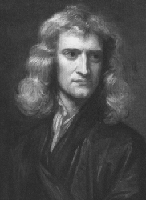
No. 2 Sir Isaac Newton
The second, and more important item that was brought out in the Principia was the law of Universal Gravitation. This law states essentially that the force between any two objects can be found. Any objects. The implication of that is staggering. It allows for orbits to be calculated, and it allows for a person's mass to be determined. That simple law (It has only 4 variables) can explain most of the physical world, and most modern physics can be related to either that law or the three laws concerning motion. Newton is also known for another achievement-Calculus. Calculus is the study of math used to find the area under a curve, extremely useful in science because it allows for most higher geometry, and that is important because it allows for a better understanding of how the world works. In 1704 he published his theories on Calculus, and with that the study of mathematics improved from dramatically, allowing for most of the higher math that we know of now. Newton's contributions were not unknown in his time. He was the representative of Cambridge to Parliament, and also the Administrator of the Royal mint from 1699 to his death in 1727. He also was one of the first 'celebrities' in science, even among those who did not know, or did not have the intellectual background to understand the significance of his theories. Newton died on March 31 1727, and was immediately acclaimed as one of the best scientists in the world. This sentiment is best described by Alexander Pope, who wrote, "Nature and Nature's laws lay hid in night; God said, Let Newton be! and all was light." Newton truly did help explain the world. Now we must discuss why these people are included in our site. The first reason is the impact on people's daily lives. Newton discovered the laws that dictate how we live. More importantly than simple knowledge, he allowed for many elements of modern technology to be developed. For example, cars would probably not have been developed if not for Newton's laws. Certainly people would not have been able to have satellites or anything that could have dealt with space or the stars. Imagine a life without satellites, imagine a life without instant communication, then you are imagining a life without Newton. The second reason for inclusion is impact on countries. Here, a little bit of thought is required. Newton was probably the greatest English scientist, and because of his thoughts, England became the center of scientific learning in Europe for quite some time. This means that England also became the center of technology, and may explain why the industrial revolution came to England only a generation after Newton's death, rather then about three generations later for the rest of Europe. Newton influenced England, thus he deserves a place on this list. The third, and final reason for inclusion, is the impact on large scale movements. Newton invented most of modern physics as well as most of modern mathematics. Those movements continue today, and are most likely even stronger than at Newton's time. Newton also influenced the scientific method, something he used quite often, and that influenced scientists from Newton's day to my day. Moreover, Newton first realized that Math could describe all of the scientific world, to a degree that had not been thought possible. The fact that we have scientists looking for a few letters that can describe everything (the so-called theory of everything), is indicative of the idea and the mode that Newton brought into play. Newton had enormous impact in our lives then and now, and thus deserves entry onto this site.
|
